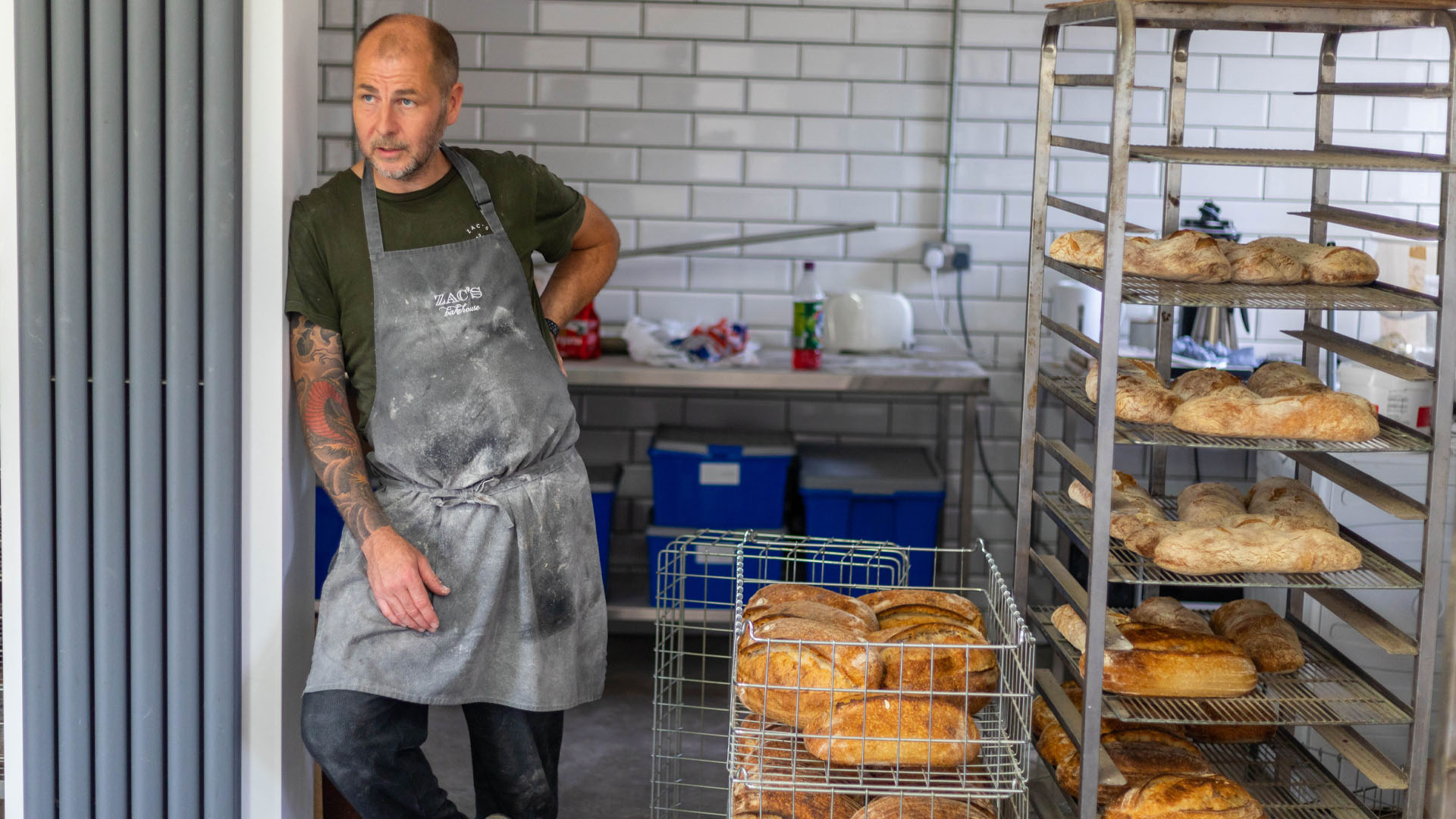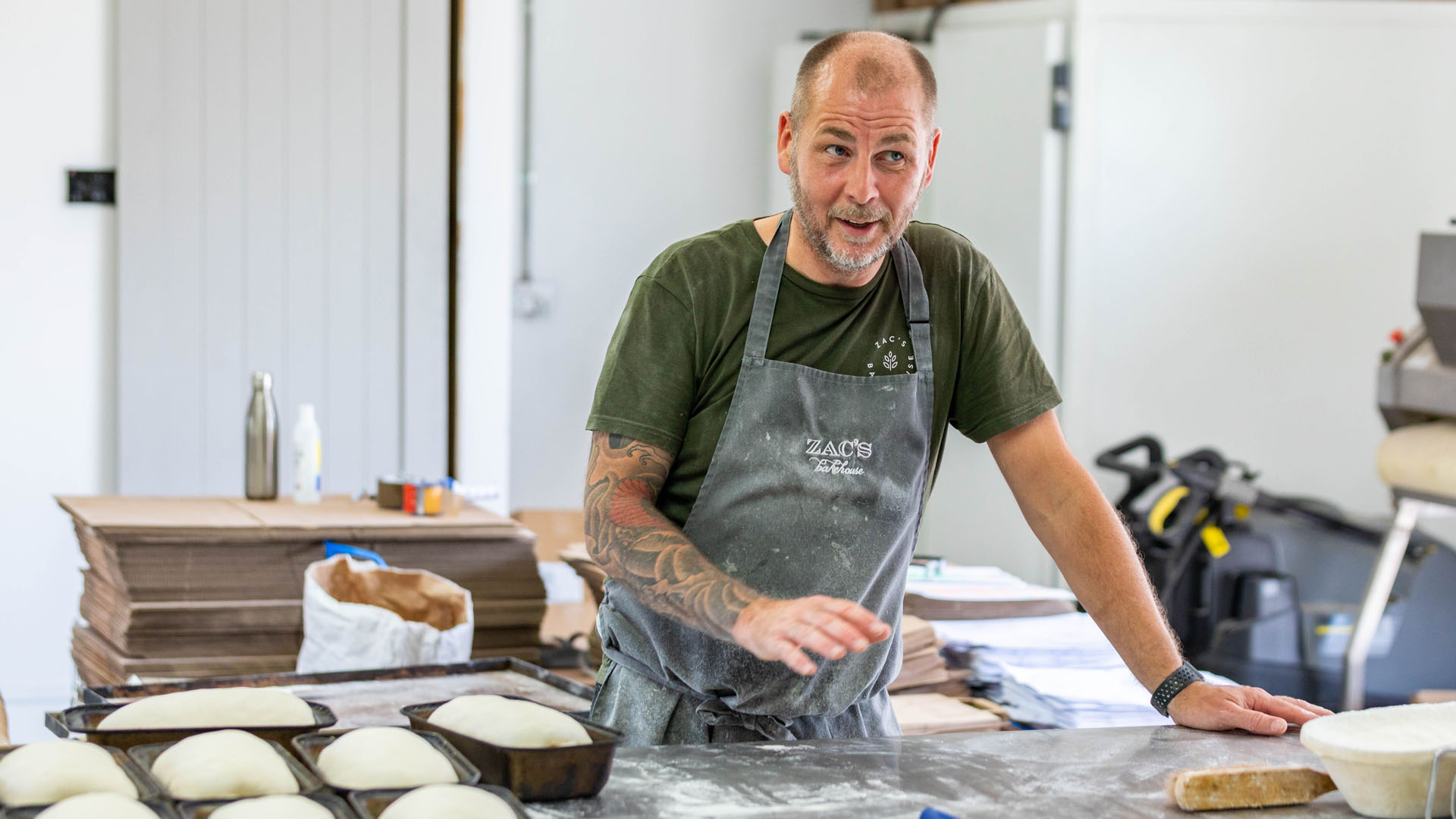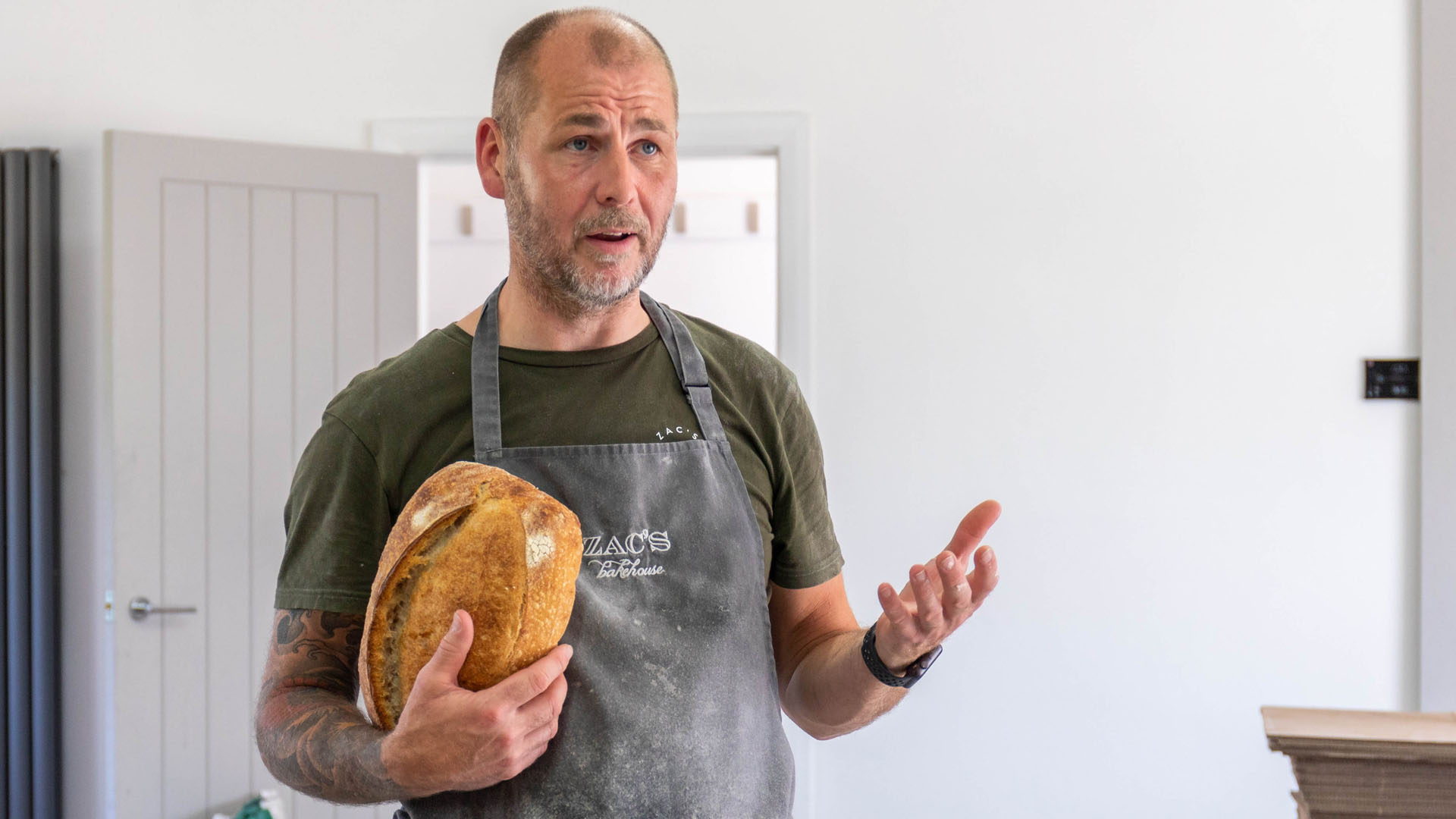Our first series explores how local chefs, restauranteurs, artisans, brewers and distillers are crafting some of the best food and drink you may or may not have heard of, furthering Northern Ireland’s culinary scene and adapting to serve local communities over the pandemic period.
How can a nation be great if its bread tastes like Kleenex?
Julia Child
Typically we have quite the structure to our interviews, but when you interview a revolutionary, it’s best to just yield the floor and let them take over, and that’s exactly what we did in our interview with Ricky Hay of Zac’s Bakehouse.
Here’s what Ricky had to say – unapologetically – about his revolutionary sourdough and what it all means for Northern Ireland’s future.
How did Zac’s Bakehouse get its start?
I’ve been cooking all my life in various places, mostly in Belfast. I worked previously at Deane’s and Galgorm for a number of years. It’s like any profession, if you work hard and you’re good at it, you’ll make money. I had the sort of attitude of, “If you’re gonna do something, you might as well do it properly.” So I sort of immersed myself into it, I worked hard and enjoyed the life.
You grow a bit older and you get news of a family coming and you start to realise that being a chef isn’t conducive to family life. My son, Zac, in which the Bakehouse gets its name, was born and, about a year later, I started to think, “Something’s gotta change here, I don’t want to do this anymore.”
Years earlier I bought a book on bread making from a second hand bookshop in New York and read it on the flight back home. I realised that the way we produced bread in the restaurant could be so much better and, when I got back home, I started working on my levain. Not many people in NI really knew what sourdough was, at that time. Most people, including myself, were brought up on that shite you buy in a shop.
It’s just about believing in something, I guess. I was convinced that I had a good product. I had chefs telling me, I don’t think sourdough is going to work for you, you should go with a yeasted bread.
But, I knew we needed to change the way we looked at bread. Sourdough, in my mind, was the way forward. Thankfully things did change and here we are! We’re now the biggest producers of proper sourdough in Northern Ireland.
How long did it take you to get the recipe down?
Fuckin’ years! Years of scratching my head! You would turn out a really good loaf and then the next four would be shite. You always have to adjust and sourdough is about 100 times harder than most breads. With yeasted dough, you can control it much easier and it’s more predictable, but sourdough just decides to go where it wants to and all you can do is manage it. There are so many variables with sourdough, including the weather from when the wheat was grown and what it’s like outside when the dough is proving. For years I was looking for the perfect loaf, but I figured out pretty quickly that I’m still looking for that loaf!
Honestly, most days, the bread is different. Some days there might be slightly more water involved, or slightly more or less salt – it just depends. So, honestly, when someone asks me what’s in your formula, it depends on the day – it won’t be the same as yesterday. It’s a process of feeling it out and learning from your mistakes. You’re always learning. I’m chasing a loaf I’m not sure even exists. If you start thinking for one second that you have it mastered, you’re in for a rude awakening – it doesn’t work that way!
Some days you just have to put your hands up and say, “I don’t know!” And that’s the frustrating part, because I should know!
You just to take it on the chin, shit happens.
Is it important to believe in the people you sell your bread to?
Absolutely! Originally, I was approached by small independents with the same ethos as myself – people who care about their products and work. Our bread is available in places like Established, General Merchants, and many other indies across the north.
Over the years I have met many ‘bread friends’ – friends through bread – who believe they have a responsibility to make the highest quality products possible.
On the other hand, there are always people who just want to duplicate what others are doing and this is when I sometimes come across as a bit of a dick. I need to like the people I do business with.
If someone comes in and says, “I’ve been looking for a decent loaf and I like yours.” I’ll say, “Great, let’s do this!” But if they come in and they say, “Oh, I had your bread at _________ and we want to be just like them”, I’ll have no time for them – It’s disingenuous.
There’s plenty of people who struggle with my simplistic outlook, but it is what it is.
I’m not going to say I refuse people, but I do turn business down. I don’t see the purpose of flooding the market. I’m doing right by the people that supported me early on when nobody else did. I need to believe in the final destination. If someone calls me looking for bread, I find out where they are, what they’re about and I’ll decide whether it’s worth it or not.
People who follow trends will always be on the search for a new one and the trend will be more important to them than the product and, in the end, you’re left with nothing. It’s a false economy. I don’t want you to be able to buy my sourdough on every street corner – it dilutes the quality.
https://www.instagram.com/p/CAiQnfpBMlE/
How does it make you feel when you see something on the market lacking quality?
I enjoy what I do. This is a passion for me. Look, anyone could work for some private company and do their work and maybe make some more coin, but you come home at the end of the day you hate yourself for it.
What aggravates me are people who tell lies. Our sourdough contains organic flours, water and salt – that’s it.
I’m not going to run anybody down, but I know with 100% certainty there are people/bakeries out there churning out sourdough that are not being honest about what they put in their bread – or the fact that their ingredients came in a bottle from fuckin’ Germany. That’s the bit that really aggravates me. If you’re going to use that shit, that’s fine, but be honest about it.
How have you adjusted to Covid-19?
Like everyone, things have changed. We’ve employed social distancing practices while at work. The wholesale has disappeared, but it will come back. It’s presenting opportunities to get creative. Customers can now order bread on our website and collect the loaves straight from the oven.
The great thing about the lockdown is people are forced into cooking at home who previously never would have. People are starting to realise, “You know what, this is actually good craic!” Getting the kids involved, which is fantastic – it’s good for everybody!
I’m glad to see it, because I personally think we’ve lost two generations of people who are close to useless in the kitchen!
Is there potential for a growing ‘eat local’ culture in NI?
Well, and this is only my opinion, but I think Northern Ireland is a great country with great people, but there is a small minority that has the worst mentality!
It can be so negative at times – anything for an argument with someone about something that doesn’t even matter in the grand scheme of things.
So, to answer your question, I’d be totally with this type of cultural change and I think it is happening – this is a gorgeous country that offers so much in terms of quality produce, ingredients and livestock. It’s the mind-set that needs a look at.
Past, Present & Future
My son, Zac and my daughter, Mya – it’s great to watch them grow up.
Zac is ten – he doesn’t give a shit about this country’s past and he shouldn’t. He’s a golfer and he’s very good at it – he doesn’t care much for school though!
We’re trying to get him to read more, so we got him Rory McIlroy’s biography.
He’s reading the book and he appears with this confusing look on his face and he asks, “Dad, what’s a Catholic?”
At this point, I burst out laughing, nearly spitting out my whiskey and thought to myself, “Fuck, that’s great – he literally hasn’t a clue!”
The point I’m making is, that’s what kids are now. They don’t know and they don’t want to know – it’s not important to them and it shouldn’t be.
I tell Zac when he’s playing golf and struggling to get out of a bunker, “Zaccy, you can’t keep playing the ball the same way and expecting anything other than the same result.
You need to change something; we need to change something.
Bread is the lifeblood of so many cultures – what is it about bread that brings people together?
There’s definitely something to that. Bread is maybe more steeped in other cultures than it has been here. I suppose it’s because, in many ways, it’s such a basic food stuff. It’s really only flour and water when it comes down to it, but it can feed a whole village. You’re basically creating food out of nothing – it’s magical. You can understand why so many cultures have relied on it and so many traditions surround it.
The difference between other cultures and here is that we never really had that embedded bread culture – certainly not sourdough. I imagine if you went back – way back – you’d find bread, but it wasn’t prominent for years. The traditional breads associated with this country are soda bread, potato bread – which, to many people’s demise, are typically mass produced rubbish – and wheaten bread, which you can argue isn’t even a bread, due to the lack of fermentation and chemical enhancement involved in it. So it really is something we need to rediscover and there are some small, independent guys out there doing great stuff.
There is certainly symbolism in breaking bread with people. And, in saying that, a lot of the people that come here for our bread end up sharing it with friends and family and they’re getting great pleasure from it. So, even though sourdough isn’t a bright, shining part of our history, there’s certainly something about it that binds us together.
‘Bread Friends’ & the Revolution
Through this, my ‘bread friends’ and I have become close. We are all passionate people about something – whether its coffee, distilling spirits or making cordials – and there’s something great about getting people like that together.
Anyone I’ve met through bread over the years are genuine, caring people. Some of them have gone as far to say I have revolutionised the baking industry in the north. They had me in stitches.
“It’s only a loaf of bread, I’m not saving anyone’s life!”
But maybe creating things like our bakehouse is part of the answer to how we continue to move forward. Like bread, opportunity was something that was supposed to be here that, maybe for a time, disappeared. Perhaps it’s on us to lay the foundation for its re-emergence in this wee place we call home.
I don’t know why bread creates community, but it does.



